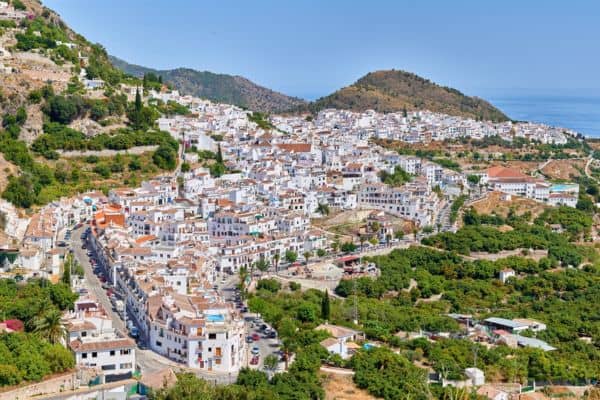Top Tips for Moving to Spain with Family

by Hayley
Moving to Spain with your family is a big deal but it can be overwhelming with so many things to think about. From helping your kids adjust to a new culture to choosing the right town and dealing with the paperwork, planning is key to a seamless transition.
This guide will give you practical advice to make your family’s move as easy as possible. Whether involving your kids in the moving process to make them feel more at ease, choosing a town that fits your family’s lifestyle or sorting out the essentials like healthcare and education, you’ll find everything you need to get ready for your new life in Spain.
If you require a removal service to Spain to help your family move, contact our team today. Now, let’s get started on the top tips for moving your family to Spain.
1. Helping Kids Adjust to Moving to Spain from the UK
One of the most important things when moving to Spain with your family is helping your kids adjust to the new environment. Get them involved in the move and they will make a big difference.
Let them pack their own belongings, choose their new room and even research fun activities and places to visit in Spain. This will give them a sense of control and excitement about the move.
Introduce your kids to the Spanish language and culture before you move and it will make the transition easier.
Take an extended holiday in Spain to get them used to the new surroundings and visit the schools they will be attending.
Learning basic Spanish phrases together can be a fun family activity that prepares them for their new life. Keeping some sense of routine and familiarity, such as their bedtime rituals and favourite toys, will provide comfort during the adjustment period.
Social connections are key to making your kids feel at home in Spain. Arrange playdates with local kids, get them into extracurricular activities and join expat groups.
Also address their concerns and emotions openly. Be patient during this adjustment period as it may take time for them to settle in.
2. Choosing the Right City for Your Family
Choosing the right city in Spain is a big decision that will affect your family life. Each city has its advantages so you need to think what matters most to your family. Barcelona has stunning architecture and beautiful beaches and has family-friendly suburban housing for expat families. Malaga in Costa del Sol has a safe environment and good facilities so it’s another good option.
If you want a vibrant international community Alicante might be the city for your family. Its beautiful beaches and lively atmosphere makes it a popular destination for expat families.
The Balearic and Canary Islands have idyllic settings with strong expat support networks perfect for families who want a more relaxed life.
Madrid the capital has job opportunities, big housing and top rated bilingual and international schools. The city has parks and green areas where children can have fun so it’s a good option for families. But choosing the right one is key to having a good life and your children’s well being.
3. Finding Your New Home
Finding your new home is a big part of your move to Spain. Initially you may need a short term rental while you wait for your permanent home to become available or decide on a location. Websites like Idealista and Fotocasa are great for finding short term rentals in Spain. It’s important to understand the rental market as it varies by region and will affect your rental experience.
When renting a home in Spain you will need several documents including a NIE (Número de Identificación de Extranjero) translated into Spanish.
Inspecting properties in person or virtually can help you see the space and condition before you make a decision.
Understanding extra costs like utilities and internet can also prevent surprises while renting as a Spanish resident.
It’s not obligatory but can cover your belongings and liability in rented properties. Follow these steps and your rental will be a breeze.
4. Visa Requirements
Visa requirements are a big part of your move to Spain. A general list of documents needed for a visa application is: passport, copies of photo and personal info pages, passport photo, marriage certificate, police certificate, medical certificate, medical insurance. The residency visa allows most foreigners to stay in Spain more than 90 days, up to 5 years depending on the type, including the Spanish residence permit.
For non-EU/EEA relatives of non-EU/EEA citizens, a family reunification visa is needed to join family members in Spain. To get this Spanish family visa, the family member in Spain must have lived there for at least one year. The process can take up to 8 months so plan ahead. An extra £500 per month per family member is also required if joining a family member who is working in Spain.
Know the types of visas (student visa, work visa, residence visa) and choose the one that fits your family. Get to know the visa requirements and prepare the documents and you’ll be all set for your new life in Spain.
5. Healthcare Options For Your Family
Understanding healthcare options is key to keeping your family well in Spain. The Individual Health Card (TSI) is essential to access public healthcare. Each family member must have their own TSI as it’s not transferable. The TSI allows you to access subsidised meds and assign a family doctor.
To apply for the TSI you will need a recent certificate of registration and proof of identity.
The process starts at the local town hall where you will first need to register and get a padrón.
Many expats opt for private health insurance in Spain as the waiting times are lower and more treatment options.
In Spain, children are free healthcare, health and dental care under the public system. Residents pay a percentage for prescriptions depending on age and income, the rest is subsidised. By understanding the system and private insurance you can have medical cover for all your family.
6. Setting up Financial Services
Setting up financial services is a must when moving to Spain. Having a Spanish bank account is necessary for managing your finances and paying taxes. To open a bank account as a foreign resident you will need a passport and an address. You may also need an NIE number and sometimes proof of employment or self employed registration. Foreign non residents can open a bank account with a passport and a non residency certificate.
To get a non residency certificate you will need to visit a local Police Station or foreign office with your passports. The certificate is issued in about a week and is valid for 3 months. Non resident bank accounts in Spain can be in foreign currency which can be useful for managing international finances.
Banks in Spain charge for account services, quarterly, transactional or service based commissions. Knowing these fees and what is required to open a bank account will help you manage your finances.
7. Learning Spanish With Your Family
Learning Spanish is key to fitting in to your new community and daily life in Spain. Being fluent in Spanish means social interactions and relationships with locals will be easier. Online platforms and apps like Duolingo and Babbel are popular for learning Spanish.
Talking to native speakers is the best way to improve your language skills.
Joining expat groups, like Facebook groups or language exchanges, is also a great way to meet other expats in Spain and practice Spanish.
The MumAbroad network gives you access to English speaking Spanish teachers so it’s easier for expat families to learn together.
You may also need to learn regional languages like Catalan, Galician and Basque depending on the region. Children pick up these languages very quickly especially if they’re learning them at school. By learning Spanish together your family will have a more immersive and connected experience in Spain.
8. Transport and Driving Licences
Getting around Spain requires understanding transport and driving licences. UK driving licences are valid in Spain for 6 months after entry or from the date of obtaining residency. Non-EU visitors may need an International Driving Permit in addition to their home country driving licence to drive in Spain. EU citizens can drive in Spain with a foreign driving licence. This is allowed for up to 2 years.
Non-EU citizens can drive in Spain with a foreign driving licence for a maximum of 6 months. To get a Spanish driving licence you need to have a medical and register with the Provincial Traffic Headquarters. Knowing this will help you navigate the process and make sure you are allowed to drive in Spain.
Using public transport, buses, trains and trams can also help. Spain has a big public transport network that is reliable and cheap so it’s easy for families to move around and between cities
9. Hiring Childcare Support
Hiring childcare support can ease the transition for families moving to Spain. Two valuable resources for finding nannies in Spain are the International Au Pair Association (IAPA) and GreatAuPair. Nanny services in Spain typically require families to establish a formal employment contract covering tax and insurance.
Au pairs provide basic childcare and light household duties while receiving food and accommodation from the host family. Rates for babysitters in Spain generally range between €7.80 (£6.59) and €8.50 (£7.18) per hour, varying by individual arrangements.
Finding reliable childcare support is essential for families transitioning to a new country, ensuring that children are well cared for and parents can focus on settling in.
10. Navigating the Education System
Navigating the education system in Spain is key to your children getting a good education. The Spanish education system is a mix of national and regional governance, each of the 17 regions manage their own education policies. Primary and secondary education in Spain is compulsory and free for children from 6 to 16.
Secondary state schools in Spain are free but you may have to pay for books and materials. Students who complete compulsory secondary education get a Graduation Certificate which can lead to higher education. Upper secondary education or Bachillerato gives students the qualifications to enter university.
Vocational training in Spain has two levels: Grado Medio for basic training and Grado Superior for advanced skills, both with different durations. Nursery schools in Spain can be state or private, with different prices and services. Public childcare in Spain is subsidised so it’s the most economical option for families.
11. Enrolling in International Schools
Enrolling in international schools can provide your children with a familiar educational environment while living in Spain. International schools in Spain cater to foreign students, providing education in multiple languages before transitioning to local schools. There are 281 international schools across 28 cities in Spain, predominantly located in Madrid and Barcelona.
Types of international schools include bilingual schools, schools following native country curricula, and international schools teaching in foreign languages like English and French. American international schools follow the US education model and may offer Advanced Placement (AP) programs for college-level courses. British international schools typically adhere to the British education system, offering GCSEs and A-levels and are accredited by the National Association of British Schools in Spain (NABSS).
International schools often provide globally recognised qualifications like the International Baccalaureate (IB), which starts from age three and continues until 19. Fees for international schools in Spain can range significantly, from about €2,000 (£1,689) to over €20,000 (£16,898,80) per year. Parents should consider the school’s diverse environment and the extracurricular activities offered, which support international learning.
12. Getting used to Cultural Differences
Adapting to cultural differences is part of moving to Spain. In Spain people stand closer and speak louder than in other countries, which can feel invasive to newcomers. Knowing these communication styles will help you feel more at ease in social situations. Spaniards say no less directly than other cultures so being aware of these subtleties will help with smoother interactions.
Public space usage in Spain, like littering or lack of cleanliness can be a shock to newcomers from more strict cultures.
To minimize culture shock engage with locals, observe social interactions and keep an open mind to Spanish ways and customs.
By embracing these cultural differences you’ll have a richer and more enjoyable experience in Spain.
Moving To Spain
Moving to Spain requires planning and a good international removal company. Companies like Simpsons do Spain removals by road to mainland destinations and by container ship to the Canaries. Involve your children in packing their toys, clothes and other belongings and it will make the process more enjoyable for them and they will feel part of the move.
On moving day try to keep the children out of the way to make the process run smoothly.
By choosing a good international removal company and involving your family in the process you will make the transition to your new home in Spain seamless.
Make Your Family’s Move to Spain Stress-Free with Simpsons International Removals
Moving to Spain with your family means sun, a new culture, stunning scenery and new experiences. From helping your kids settle and choosing the right town to understanding the healthcare system and visa requirements, planning is key.
At Simpsons International Removals we make overseas moves stress free for families. Our container shipping service to Spain covers everything from professional packing and secure transportation to customs clearance and delivery, so you can get on with settling into your new home. Whether it’s a small move or a full household relocation we’re here to help you every step of the way.
Recommended Posts

Benefits of Moving to Spain: Soak Up the Sun & Culture in 2025
Thursday, 27th February 2025

Embracing the Spanish Way: A Guide to Thriving in the Local Culture When Moving to Spain
Thursday, 2nd January 2025

The Top Things To Do in Barcelona When You Live There
Thursday, 19th September 2024







